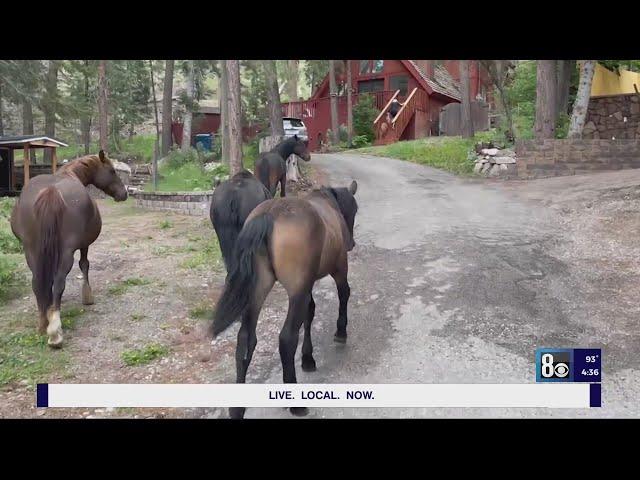Community Unites to Challenge Mt. Charleston Wild Horse Roundup
At the picturesque Mt. Charleston, a coalition of concerned residents and animal welfare advocates convened this week to protest the recent wild horse roundup operations. Armed with signs,chants,and personal stories,the group highlighted the urgent need to reconsider current management practices that threaten the well-being of these free-roaming herds. The gathering emphasized the delicate interplay between preserving wildlife and managing public lands, urging officials to explore compassionate alternatives that protect both the horses and the environment.
To educate attendees, organizers set up an interactive display presenting vital information about wild horse populations, their ecological significance, and the repercussions of past roundups. The following table illustrates population estimates alongside the number of horses removed during previous interventions:
| Year | Estimated Wild Horse Count | Number Removed | Population Post-Removal |
|---|---|---|---|
| 2019 | 520 | 115 | 405 |
| 2021 | 460 | 130 | 330 |
| 2023 | 430 | 145 | 285 |
Main demands from the protest included:
- Immediate cessation of the ongoing roundup activities.
- Adoption of humane,non-invasive population control methods.
- Greater clarity and active community participation in wildlife management decisions.
- Legal safeguards to ensure the long-term survival of wild horse herds.
Environmental and Animal Welfare Concerns Fuel Mt. Charleston Activism
Growing unease over the treatment of wild horses at Mt. Charleston has galvanized local activists, animal rights groups, and residents to publicly oppose federal roundup initiatives. Protesters stressed that these removals disrupt the fragile ecological equilibrium, negatively impacting native plant species and wildlife habitats. Wild horses contribute to natural grazing patterns and seed dispersal, playing a vital role in maintaining biodiversity.The forced captures not only cause physical and psychological distress to the animals but also threaten the mountain’s environmental integrity.
The coalition united around several critical issues:
- Rejection of harsh capture techniques that endanger horse safety and well-being.
- Call for science-based, sustainable management incorporating community feedback.
- Preservation of Mt. Charleston’s unique habitat essential for regional biodiversity.
- Promotion of alternative population control strategies that reduce trauma to wildlife.
| Primary Concern | Community Request | Suggested Remedy |
|---|---|---|
| Animal Protection | Stop roundup operations | Implement fertility control programs |
| Ecosystem Health | Safeguard native species | Restore and protect habitats |
| Community Engagement | Include locals in decision-making | Host regular public consultations |
Ecological Impacts of Herbicides and Wildlife: Expert Insights
Environmental scientists have voiced significant concerns regarding the use of herbicides such as glyphosate-based products near wild habitats, including areas inhabited by wild horses. Dr.Elaine Harper,an expert in rangeland ecology,explains that glyphosate disrupts native plant communities critical for sustaining diverse wildlife populations. “The loss of indigenous flora cascades through the ecosystem, affecting food availability and habitat quality for numerous species,” she states. This chemical interference compounds the stress wild horses face from roundup activities.
Research indicates that glyphosate residues persist in soils and waterways, leading to prolonged habitat degradation. The table below summarizes key environmental effects documented by toxicologists:
| Impact Category | Observed Consequence | Wildlife Implication |
|---|---|---|
| Plant Diversity | Significant reduction in native species | Decreased forage for herbivores |
| Soil Ecosystem | Lowered microbial populations | Disrupted nutrient cycles |
| Water Quality | Presence of glyphosate residues | Threat to aquatic organisms |
| Food Web Dynamics | Altered pollinator numbers | Interference with reproductive patterns |
- Fragmentation of habitats due to vegetation loss limits safe wildlife movement corridors.
- Heightened susceptibility of wild horses to predators and illnesses from diminished resources.
- Potential accumulation of toxins in predators higher up the food chain.
Advocating for Policy Change and Humane Wild Horse Management
In light of the recent Mt. Charleston roundup, environmentalists and community members are pressing policymakers to enact robust reforms that prioritize both wild horse welfare and ecosystem health. Protesters stress the necessity for transparent, science-driven management plans that move beyond mass removals, favoring humane alternatives like fertility control and habitat enhancement.They urge federal and state agencies to collaborate closely with local stakeholders—including Indigenous communities, conservationists, and landowners—to develop sustainable, inclusive solutions.
Key proposals put forth by advocates include:
- Increased investment in long-term fertility control research and application.
- Improved monitoring systems and open data sharing on wild horse demographics.
- Formation of community-led oversight committees to guide management decisions.
- Commitment to habitat restoration projects to reduce competition for resources.
| Suggested Reform | Anticipated Outcome |
|---|---|
| Fertility Control Initiatives | Stabilized populations without harmful roundups |
| Community Oversight Boards | Enhanced transparency and local engagement |
| Habitat Restoration Efforts | Sustainable resource availability for wildlife |
Conclusion: Balancing Wildlife Conservation and Community Concerns
The recent presentation at Mt. Charleston brings to light the escalating conflict between wildlife management policies and public advocacy for ethical treatment of wild horses. As discussions continue regarding the optimal strategies to safeguard the region’s ecosystems, local voices remain resolute in demanding humane, transparent, and scientifically informed approaches. While authorities have yet to issue a comprehensive response, this movement underscores the critical need to harmonize environmental stewardship with community values. Ongoing updates will be provided as developments unfold.
